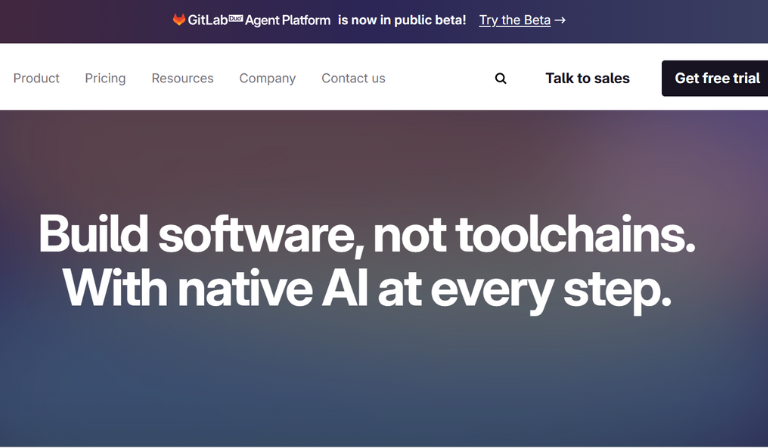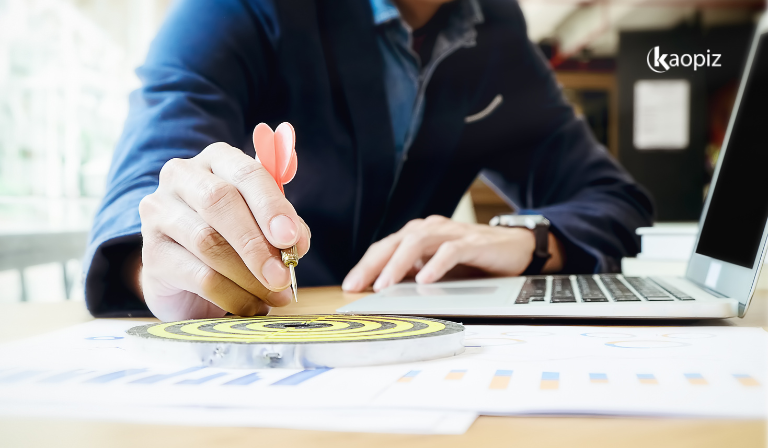Git vs. GitHub vs. GitLab: What’s the Difference & Which One Should Singapore Businesses Use?
When it comes to software development, choosing the right version control and collaboration tool is crucial. Git, GitHub, and GitLab are commonly used, but many businesses, especially in Singapore, struggle to understand their differences.
While Git serves as the foundation, GitHub and GitLab offer cloud-based platforms with features for collaboration, CI/CD, and security. In this guide, we explore the key differences between Git vs GitHub vs GitLab and help you determine which is best for your business.
Table of Contents
- What Is Git?
- What Is GitHub?
- What Is GitLab?
- Git vs GitHub vs GitLab: Detailed Comparison
- Which One Should Singapore Businesses Use?
- Future Trends of Git, GitHub, GitLab
- Kaopiz: Your Trusted IT Outsourcing Partner with Expertise in Git, GitHub, and GitLab
- Conclusion
- FAQs
What Is Git?
Git is a distributed version control system that allows multiple developers to collaborate on software projects. It manages changes to the source code over time. Different team members can work on separate parts of a project without interfering with each other.

Git tracks changes, lets teams revert to earlier versions, and keeps all edits documented.
Key Features of Git:
- Local Repository: Git allows developers to work with a local copy of the repository. That means you can make changes and commit them even without an internet connection.
- Branching and Merging: Git makes it easy to create new branches, work on features independently, and merge them back into the main project. This encourages parallel development without conflict.
- Offline Use: Unlike centralized systems, Git lets developers commit changes and view project history without an internet connection.
Pros and Cons of Git:
| Pros | Cons |
|---|---|
| Fast and efficient | Steep learning curve for beginners |
| Flexible branching and merging | Can be complex for small projects |
| Supports offline work | Merge conflicts can be difficult to resolve |
| Local storage for repositories | Advanced commands can be challenging |
Best For:
- Developers needing a robust version control system for source code management
- Open-source projects that require collaboration and version tracking
- Startups and small teams looking for flexible workflows
- Distributed teams working remotely or across different locations
- Both small apps and large software systems requiring efficient project management and code integrity
What Is GitHub?
GitHub is a cloud-based hosting platform built around Git that allows developers to manage and store their Git repositories online. Then, it enhances Git’s core functionality by offering tools that enable collaboration, project management, and seamless code sharing across teams.

GitHub is widely used by both open-source communities and private organizations for version control, code review, and deployment.
Key Features of GitHub:
- Collaboration: GitHub makes it easy to collaborate on code using pull requests, issue tracking, and code reviews.
- GitHub Actions (CI/CD): Built-in CI/CD tools to automate workflows, testing, and deployment.
- Code Sharing & Hosting: Unlimited public repositories with the option for private repositories for paid plans.
- Community: GitHub has a vast developer community, making it easy to contribute to open-source projects and share knowledge.
- Integrations: Supports integrations with other tools like Slack, Jira, and Trello, allowing for enhanced project management.
Pros and Cons of GitHub:
| Pros | Cons |
|---|---|
| Large and active community | Limited private repositories on free plans |
| Easy collaboration with pull requests and code reviews | Can be less flexible than GitLab for self-hosting |
| Built-in CI/CD with GitHub Actions | Learning curve for advanced features |
| Free public repositories | Private repository features are limited on free plans |
Best For:
- Open-source projects that benefit from global collaboration and code sharing.
- Startups and small teams needing an easy-to-use, cloud-based version control system with collaboration tools.
- Enterprise organizations looking for Git-based management with integrated workflows and community involvement.
- Developers and teams that prioritize a strong community presence and code sharing.
What Is GitLab?
GitLab is a Git repository manager that provides a complete DevOps lifecycle platform. It combines version control, CI/CD, project management, and security in one tool. Teams can collaborate efficiently from development to deployment.

GitLab is ideal for teams needing a complete DevSecOps solution, self-hosted or cloud-based.
Key Features of GitLab:
- CI/CD Built-in: GitLab’s built-in CI/CD capabilities allow teams to automate the entire software delivery process, from code testing to production deployment.
- Project Management: GitLab provides issue tracking, Kanban boards, and milestone tracking, making it easier to manage projects and tasks within the same platform.
- Self-hosting Options: GitLab offers the flexibility to be deployed on-premises or in a private cloud, giving teams full control over their environment and security.
- Advanced Security: GitLab includes features like static code analysis, dependency scanning, and security dashboards, ensuring that security is integrated throughout the DevOps pipeline.
- Collaboration and Code Review: Like GitHub, GitLab supports merge requests, code reviews, and team collaboration, but with added features for DevOps integration.
Pros and Cons of GitLab:
| Pros | Cons |
|---|---|
| Built-in CI/CD for automation | Can be complex for small teams or projects |
| Strong project management tools | Steeper learning curve compared to GitHub |
| Self-hosting options for full control | Some features are behind a paywall (e.g., advanced security) |
| Advanced security and DevOps tools | Can be resource-heavy for smaller projects |
Best For:
- Enterprises and organizations requiring comprehensive DevOps and security features integrated into one platform.
- Teams looking for self-hosting options to ensure control over their infrastructure and security.
- Development teams that need automated CI/CD pipelines for efficient software delivery and deployment.
- Companies that need a complete DevSecOps solution covering development, security, and operations in a single tool.
Git vs GitHub vs GitLab: Detailed Comparison
To help you understand the differences between Git vs GitHub vs GitLab, here’s a clear comparison table:
| Feature | Git | GitHub | GitLab |
|---|---|---|---|
| Type | System (version control) | Platform (Git-based hosting) | Platform (DevOps lifecycle) |
| Primary Purpose | Version control and tracking | Code hosting and collaboration | Full DevOps, CI/CD, and project management |
| Hosting | Local | Cloud-based | Cloud-based or self-hosted |
| Collaboration Features | Branching, merging | Pull requests, code reviews | Merge requests, code reviews, project management |
| Cost | Free | Free (with paid plans for private repos) | Free (with paid tiers for advanced features) |
| CI/CD Capabilities | No built-in CI/CD | GitHub Actions (CI/CD) | Built-in CI/CD |
| Security & Compliance | Basic | Basic, with third-party integrations | Advanced security features, vulnerability management |
| Community Adoption | Widely used by developers | Largest open-source community | Growing in enterprise and DevOps environments |
| Target Users | Developers needing version control | Open-source communities, startups | Enterprises, DevOps teams, and security-conscious companies |
Type
- Git: A distributed version control system for managing and tracking changes to source code locally. It is not a platform but a tool for version control, allowing offline work and collaboration.
- GitHub: A cloud-based platform built around Git, focused on collaboration, code sharing, and project management with additional features like pull requests and CI/CD integrations.
- GitLab: A Git-based platform that offers a complete DevOps lifecycle, integrating version control, CI/CD, project management, and security, with both cloud and self-hosting options.
When comparing Git vs GitHub vs GitLab, each of these tools serves a unique purpose in the software development process. Git focuses solely on version control, while GitHub and GitLab provide cloud-based platforms with additional features for collaboration, automation, and project management.
Primary Purpose
- Git: Git’s primary purpose is version control for managing and tracking source code changes, enabling developers to collaborate efficiently on different versions of a project.
- GitHub: GitHub’s purpose is to host Git repositories and enhance collaboration with tools for code sharing, issue tracking, and CI/CD integration.
- GitLab: GitLab’s primary purpose is to offer a complete DevOps platform, integrating version control, CI/CD, project management, and security for the entire development lifecycle.
Git focuses on version control, while GitHub and GitLab provide collaborative platforms with additional DevOps capabilities.
Hosting
- Git: Git operates locally, meaning that repositories are stored on the developer’s own machine. Git does not provide hosting services, leaving developers to choose their own methods for sharing and backing up repositories (e.g., through file systems or external cloud services).
- GitHub: GitHub is a cloud-based platform where repositories are hosted on GitHub’s servers. It allows easy access and sharing of repositories over the internet, offering both public and private repository hosting options. Users rely on GitHub for online storage and collaboration.
- GitLab: GitLab offers cloud hosting and the option for self-hosting, allowing organizations to host their own GitLab instance on their own servers. This provides flexibility for teams requiring private hosting environments or those with strict data security and compliance needs.

Git is local, while GitHub provides cloud-based hosting, and GitLab offers both cloud and self-hosting options.
Collaboration Features
- Git: Git provides branching and merging as its core collaboration features, allowing developers to work on different parts of a project independently. However, it lacks built-in tools for communication or tracking, making it more suited for local version control rather than direct collaboration.
- GitHub: GitHub excels in collaboration with features like pull requests, code reviews, issue tracking, and discussions. It allows teams to easily review, comment, and merge changes, fostering an efficient collaborative workflow. GitHub also enables social collaboration through forking and contributing to open-source projects.
- GitLab: GitLab offers similar merger requests and code review tools but goes further with integrated project management features such as Kanban boards, milestones, and issue tracking. GitLab also supports epic management for larger projects, making it suitable for end-to-end collaboration across the entire development lifecycle.
Considering features between Git vs GitHub vs GitLab, GitHub and GitLab enhance collaboration by providing integrated tools for code review, issue tracking, and project management, whereas Git is limited to basic branching and merging.
Cost
- Git: Git is free to use, as it is an open-source tool. There are no associated costs for using Git locally, aside from any optional hosting or storage services developers may choose to use.
- GitHub: GitHub offers a free tier for public repositories, and users can have private repositories with limited features. Paid plans are available for private repositories and enterprise features, with pricing based on the number of collaborators and storage requirements.
- GitLab: GitLab also offers a free tier with public and private repositories, but with more advanced features such as built-in CI/CD and project management tools available in paid plans. GitLab provides self-hosting options as well, which can be more cost-effective for large enterprises or teams with specific infrastructure needs.
Git is free, GitHub provides a mix of free and paid plans, and GitLab offers both free access and paid tiers with additional enterprise features and self-hosting options.
CI/CD Capabilities
- Git: Git itself does not have CI/CD capabilities. It is primarily a version control system. However, Git can be integrated with external CI/CD tools like Jenkins, Travis CI, or CircleCI to automate testing, building, and deployment processes.
- GitHub: GitHub offers GitHub Actions, a built-in CI/CD tool that allows users to automate workflows such as testing, building, and deploying code directly from their GitHub repository. It integrates seamlessly with the platform and can be customized with a wide range of actions.
- GitLab: GitLab provides native CI/CD tools that are built into the platform. It offers powerful automation for continuous integration, continuous delivery, and continuous deployment, including features like Auto DevOps, custom pipelines, and deployment monitoring. GitLab’s integrated approach makes CI/CD more accessible and streamlined for users.
Git does not include CI/CD, while GitHub uses GitHub Actions and GitLab offers comprehensive native CI/CD capabilities, making GitLab more robust for end-to-end DevOps workflows.
Security & Compliance
- Git: Git itself does not offer built-in security features beyond basic version control. Security depends on how repositories are hosted and managed, with external tools or services providing additional layers of protection such as encryption, access control, and audit logs.
- GitHub: GitHub provides several security features, including two-factor authentication (2FA), branch protection rules, and security advisories for managing vulnerabilities. GitHub also integrates with security tools to scan for vulnerabilities in code dependencies, but advanced security compliance features are mostly available on GitHub Enterprise.
- GitLab: GitLab offers advanced security and compliance features such as static and dynamic application security testing (SAST, DAST), dependency scanning, and container scanning built into its CI/CD pipelines. GitLab also supports role-based access control (RBAC), audit logs, and the ability to meet compliance standards like GDPR, ISO 27001, and more, making it well-suited for organizations with strict security requirements.
Git does not have security features by default, while GitHub provides basic security tools, and GitLab excels with integrated security and compliance features, making it the preferred choice for enterprises needing robust security controls.
Community Adoption
- Git: Git is widely used as a version control system, integrated into many development workflows across the globe, but lacks a centralized community platform.
- GitHub: GitHub is the most popular platform for open-source projects, with a large global community of developers, making it the go-to choice for code sharing and collaboration.
- GitLab: GitLab’s adoption is growing, particularly in enterprise environments and DevOps teams, though it has a smaller open-source community compared to GitHub.
Git is foundational, GitHub dominates the open-source community, while GitLab is popular in enterprise and DevOps circles.
Target Users
- Git: Git is suitable for developers and teams who need a robust, distributed version control system. It is ideal for both individual developers and small to large teams working on software projects, particularly when offline access or local version control is important.
- GitHub: GitHub is best suited for open-source projects, startups, and small to medium teams who need a platform for collaboration, code sharing, and community contributions. It’s especially popular with developers who prioritize a global community and integration with other tools.
- GitLab: GitLab is targeted at enterprises, DevOps teams, and organizations requiring a complete DevOps pipeline. It is ideal for large teams needing advanced security, CI/CD integration, and self-hosting options for better control and compliance.

Git serves individual developers, GitHub is the best for open-source enthusiasts and startups, while GitLab caters to enterprise teams and DevOps-focused organizations.
Which One Should Singapore Businesses Use?
Choosing Git vs GitHub vs GitLab depends on your team size, security needs, and workflow complexity. For Singapore businesses, the choice comes down to basic version control or a full DevOps solution with strong security and compliance.
Use Git (Standalone)
- When you need a local version control system without relying on cloud-based platforms.
- Ideal for small projects or individual developers who don’t require advanced collaboration features.
- Perfect for managing code offline and making independent commits.
- Best for open-source projects that are hosted on platforms like GitHub or GitLab, but only need basic version control.
- Suitable for teams looking for a simple, lightweight solution without the complexity of additional tools or integrations.
Choose GitHub
- Use GitHub if you need a cloud-based platform that enhances collaboration, especially for open-source projects or teams working on code sharing and reviews.
- Ideal for startups and small to medium teams who require easy collaboration tools, including pull requests, code reviews, and issue tracking.
- Best for teams that want to integrate with a large global community of developers, contribute to open-source projects, and leverage third-party integrations.
- If you’re looking for a platform that supports CI/CD workflows and simplifies deployment with tools like GitHub Actions.
- Suitable for teams that want a ready-to-use solution for version control, collaboration, and cloud hosting of repositories.
Choose GitLab
- Using GitLab if you need an all-in-one DevOps platform that integrates version control, CI/CD, project management, and security features.
- Ideal for enterprises needing advanced security, compliance, and self-hosting.
- Best for organizations with complex CI/CD workflows, needing tight integration between code development, testing, and deployment.
- Choose GitLab if your team needs to automate the entire development lifecycle, including continuous integration, deployment, and monitoring.
- Suitable for businesses focused on security, DevSecOps, and scalable software delivery, especially in regulated industries like finance or healthcare.
Future Trends of Git, GitHub, and GitLab
As software development continues to evolve, Git vs. GitLab vs. GitHub is adapting to meet new challenges and opportunities. Here’s a concise overview of the anticipated trends shaping these platforms in 2025 and beyond:
- AI in Software Development: GitHub Copilot and GitLab Duo automate coding, testing, and bug fixes. Expect further AI integration into code review, testing, and bug fixing to boost productivity.
- DevSecOps as the Standard: Security will become integrated into every stage of the development pipeline. GitLab is leading with DevSecOps features, and GitHub is enhancing security tools to provide automated vulnerability detection and compliance management.
- Cloud-Native DevOps: As businesses continue shifting to the cloud, platforms will optimize for cloud environments, ensuring scalability, resilience, and better integration with cloud services like AWS, Azure, and GCP.
- Extensibility and Customization: GitHub and GitLab will keep expanding their APIs and marketplaces, giving developers and enterprises more ways to customize and extend the platforms to meet specific needs.
To sum up, Git remains foundational, while GitHub and GitLab evolve with AI, security, and cloud improvements.
Kaopiz: Your Trusted IT Outsourcing Partner with Expertise in Git, GitHub, and GitLab
With 10+ years of experience and a team of 600+ professionals, Kaopiz has successfully delivered 1,000+ projects for 200+ global clients. We specialize in providing custom software solutions with a focus on version control, DevOps, and collaboration tools.

Kaopiz leverages our expertise in Git, GitHub, and GitLab. We help clients streamline development workflows. We foster better collaboration and implement strong version control. This drives efficiency and scalability.
Whether you are a startup looking for efficient code management solutions or an enterprise in Singapore aiming to integrate advanced CI/CD pipelines, DevSecOps, and security compliance into your workflows, Kaopiz is trusted IT outsourcing company and has the expertise to support your needs.
- Git: We help businesses implement Git-based workflows for distributed version control, ensuring that teams can work seamlessly on code while maintaining flexibility and control over their development environment.
- GitHub: Our team leverages GitHub to enhance collaboration across global teams, enabling easy code sharing, pull requests, automated workflows with GitHub Actions, and CI/CD integrations for streamlined deployment.
- GitLab: As experts in GitLab, we implement DevOps pipelines, automated testing, and security features to ensure end-to-end software delivery. We support both cloud-hosted and self-hosted GitLab instances, making it ideal for businesses requiring scalability and customization.
With Kaopiz as your partner, you can harness the full potential of Git, GitHub, and GitLab. We ensure your development processes are secure, efficient, and future-proof. Let us help you take your software development to the next level!
Conclusion
Choosing the right tool for version control and collaboration is essential for efficient software development. The Git vs GitHub vs GitLab difference lies in the unique benefits each offers, from basic version control to full DevOps integration and community collaboration.
At Kaopiz, we help businesses leverage Git, GitHub, and GitLab. We support them in streamlining workflows, enhancing collaboration, and ensuring secure, scalable software delivery. Let us guide you in optimizing your development processes—reach out to Kaopiz today!
FAQs
- Is GitHub the Same as Git?
- No, Git is a version control system, while GitHub is a platform built on Git for hosting repositories and enhancing collaboration through features like pull requests, issue tracking, and CI/CD integrations.
- Why Do Singapore Companies Use GitLab Instead of GitHub?
- Many Singapore companies prefer GitLab for its integrated DevOps capabilities, including built-in CI/CD, security features, and self-hosting options, making it ideal for enterprises needing complete control over their workflows.
- Can I Use Git without GitHub or GitLab?
- Yes, Git can be used independently for version control. However, GitHub and GitLab provide additional collaboration and project management tools that make teamwork and automation easier.
- Which Is Better: GitHub or GitLab for Enterprises in Singapore?
- GitLab is often preferred for enterprises in Singapore due to its end-to-end DevOps capabilities, advanced security, and compliance features. GitHub is better for teams focused on open-source collaboration or needing extensive third-party integrations.
- Why Is GitLab Considered Better Than GitHub for CI/CD?
- GitLab offers built-in CI/CD tools as part of its platform, making it a more seamless and comprehensive solution for automating workflows. While GitHub has GitHub Actions, GitLab’s CI/CD features are more integrated and feature-rich, particularly for complex enterprise workflows.
Trending Post





















No Comments yet!